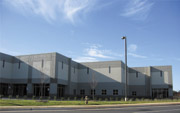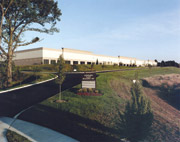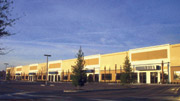ACTIVITY INCREASES
FOR INDUSTRIAL MARKETS
Developers discuss the current industrial market and their
plans for the future.
Dawn Pick Benson
Amidst a sluggish economy, industrial development across the
Southeast has slowed in the last few years. However, things
are looking up in several markets — and a
few haven’t skipped a beat at all. With this in mind, developers
say they are keeping a close eye on the market and looking forward
with optimism to a renewed pace in development.
The Current Market
 |
|
McDonald Development Company
developed Horizon Ridge in Atlanta.
|
|
The Atlanta industrial market is showing signs of renewed
strength, according to John McDonald, president of McDonald
Development Company. Despite previous dot-com failures and
2 years of a slow economy, leasing prospects and potential
build-to-suit opportunities have increased consistently since
the beginning of the year, says McDonald.
Currently, the strongest markets in Atlanta are the Hartsfield
International Airport and Fulton Industrial districts. Properties
in these areas of south Fulton and Clayton counties benefit
from their proximity to the airport, access to interstate highways
and competitive leasing rates. Existing industrial properties
in these markets are also profiting from new, large-scale retail
and residential developments along Camp Creek Parkway.
Nashville, Tennessee’s industrial market is also seeing
changes for the better. “Things are improving from where
they were in 2002,” says Whitfield Hamilton, managing
principal at Colliers Turley Martin Tucker in Nashville. In
the first quarter of this year, the overall Nashville industrial
market had a 6.9 percent vacancy rate. There has been 874,000
square feet of new net absorption, and 828,000 square feet
of product is under construction. According to Hamilton, this
construction is leased, build-to-suit product, which will
be additional absorption once the buildings are complete.
 |
|
Duke Realty Corporation is developingAirpark
East in Nashville, Tennessee.
|
|
Currently, there is quite a bit of leasing activity in Nashville.
“We still have a lot of space available, but it’s
nice to see some activity,” says Hamilton. “We’re
pleased to see companies starting to relax and commit to deals.”
Hamilton says he remains cautiously optimistic about the rest
of this year.
Most of the new development in Nashville is in the southeast
and east markets, according to Hamilton. “Historically,
the southeast market has been the most active, but over the
past 2 years, the east market has really taken off,” he
says.
The last 24 months have been extremely slow, according to Jim
Reichardt, industrial real estate director at Clinton, Tennessee-based
The Hollingsworth Companies. Reichardt does, however, see signs
of improvement. “We have seen more activity in the last
3 months than we have in the last 18,” he says. “We’re
getting more calls, we’re showing more buildings, and projects
that have been put on hold for 2 years are now back in the search.”
The Hollingsworth Companies is active in Alabama, North Carolina,
Tennessee and Virginia.
Most of the company’s current activity, says Reichardt,
is in Virginia. “In terms of our buildings, Virginia
has not skipped a beat. It has continued to grow, whereas
the other areas have been a little slower.” Now that
the economy is picking up, Reichardt says he also is beginning
to see activity in other areas.
 |
|
NAI Realvest Partners is currently
developing Monroe CommerCenter North in northwest
Seminole County, Florida.
|
|
“The industrial leasing market has been okay to good,”
according to George Livingston, president of Maitland, Florida-based
NAI Realvest Partners. “There’s more demand from
local companies expanding or starting up than national companies,”
he says. “National companies are consolidating or extending
in their current space.”
Vacancies across the market continue to increase slightly, and
there is still some downward pressure on rent, according to
Livingston. “I think things should be improving from here,
though,” he says.
Most of the development in the Central Florida area is on the
periphery of Orlando, notes Livingston. He says that due to
a growing shortage of industrial-zoned land in the Orlando market,
developers must look further out to counties such as Lake, Volusia
and Osceola.
In the Works
McDonald Development is actively developing several industrial
parks in metro Atlanta. SouthPark, McDonald’s 322-acre
development in Clayton County, recently added a 273,200-square-foot
cross-dock facility and leased it to appliance retailer h.h.
gregg. By the end of the year, McDonald plans to construct two
new buildings at SouthMeadow Industrial Park near the airport:
a 354,400-square-foot cross-dock and a 184,000-square-foot rear-load.
In August, the company will begin construction on a 121,600-square-foot
expansion of its existing 134,400-square-foot rear-load facility
at Westlake, a 400-acre master-planned development at the crossroads
of the Fulton Industrial district.
There are several new developments in the Nashville area, according
to Hamilton. In Lebanon, Tennessee, ProLogis is developing a
300,000-square-foot distribution center for Falken Tire at Eastgate
Business Center. Also at Eastgate, First Industrial Realty Trust
has recently completed Eastgate 3, a 423,000-square-foot build-to-suit
for APL Logistics and Eagle Logistics.
Duke Realty Corporation is developing Airpark East at 880 Airpark
Commerce Drive in Nashville. In the east market, Panattoni recently
completed a build-to-suit for Bridgestone Firestone in its Commerce
Farms park. The 750,000-square-foot building has a built-in
expansion of 250,000 square feet. “This has been the largest
build-to-suit transaction in our market in the past year,”
says Hamilton. Commerce Farms also has three other building
pads that range from 277,000 to 460,000 square feet available
for future development.
The Hollingsworth Companies is the developer and one of the
venture capitalists for a build-to-suit at SouthPoint Business
Park in Prince George County, Virginia. The 77,500-square-foot
building will double in size in 2 years, and it will house Service
Center Metals. The projected completion date is late fall. Also
in the works is a 108,000-square-foot speculative building at
the same park. According to Reichardt, the company has also
recently signed a lease with The Music Link for a 108,400-square-foot
facility in WestBridge Business Park in Knoxville, Tennessee.
NAI Realvest Partners has three small bay projects underway
in Florida that total 280,000 square feet, according to Livingston.
Phase I of Carter CommerCenter in Winter Garden is complete,
and Phase II will start this summer. Phase I of Monroe CommerCenter
South in Sanford is complete, and Phase II is under construction.
At Hanging Moss CommerCenter in Orlando, Phase I is under construction.
The company also has another 187,000-square-foot project in
northwest Seminole County called Monroe CommerCenter North.
Phase I is complete and Phase II will start this year.
Trends
A trend that Hamilton has noticed over the past year is that
while some pent-up demand exists in the market, there is also
unwillingness on the part of corporations to spend money or
free up capital for growth. “We are starting, however,
to see some deals being made, which is a positive sign that
we could be at the beginning of a recovery,” he says.
Many new deals are also a result of consolidations, according
to Hamilton. He says cities like Nashville benefit from this.
“We have a great story to tell in terms of our distribution
efficiencies. We have three interstates that cross here, so
companies can reach over half the U.S. population within a day’s
drive.” He also notes that Nashville competes favorably
on deals that have high labor requirements. “We have a
high-quality labor pool compared to some of the cities we compete
against.”
“We’re seeing a tremendous amount of automotive production
facilities from the North begin to seek a presence in the Southeast,”
says Reichardt. This is due to the availability of labor and
low operating costs, he says. “Because automotive production
facilities are moving south, a lot of automotive suppliers want
a presence here as well,” says Reichardt. “This sector
alone is a very strong market for us. We’re currently marketing
our parks and facilities to them to make them aware of our lower-cost
transportation and service ability.”
Reichardt says he also has continued to see a reduction in the
number of manufacturing facilities and an increase in distribution
facilities. “We’re seeing a lot more products produced
elsewhere and distributed in more sophisticated warehouse distribution
facilities,” he says.
Outlook
“The Atlanta market has bottomed, and we have begun the
economic recovery phase,” says McDonald, who has worked
in the Atlanta industrial market for 30 years. McDonald anticipates
a gradual growth of business activity to continue through 2003
and 2004, culminating in a normal economic pace by first quarter
2005.
“Our market will continue to grow significantly,”
says Hamilton. “Companies locate here because they can
save money on distribution and trucking, and they can conduct
their business with a good labor supply.” Because of these
positive fundamentals, Hamilton says Nashville will continue
to win its share of major projects. The smaller companies that
support those projects will continue to thrive and grow as well.
“This is a good place to do business,” says Hamilton.
“We have a great quality of life, and our outlook is extremely
positive over the long haul.”
Livingston says he is modestly optimistic about the future.
“The architects say they’re busy, so that tells me
there probably will be something starting the first or second
quarter of next year. It’s still going to be slow, though,”
he says.
“I think development will continue to be cautious and companies
will be a lot more conservative,” says Reichardt. “As
a result, developers will have to remain extremely flexible
and be more venturesome in order to move business forward and
bring jobs to the communities they serve.” He says this
includes taking a closer look at start-up companies, providing
more improvements with lease prices and offering more flexibility
in lease terms.
“We are strong supporters of the Southeast,” says
Reichardt. “We think that companies will continue to
see the advantages of operating here because of our quality
of labor, good work ethic and low operating costs.”
©2003 France Publications, Inc. Duplication
or reproduction of this article not permitted without authorization
from France Publications, Inc. For information on reprints
of this article contact Barbara
Sherer at (630) 554-6054.
|
